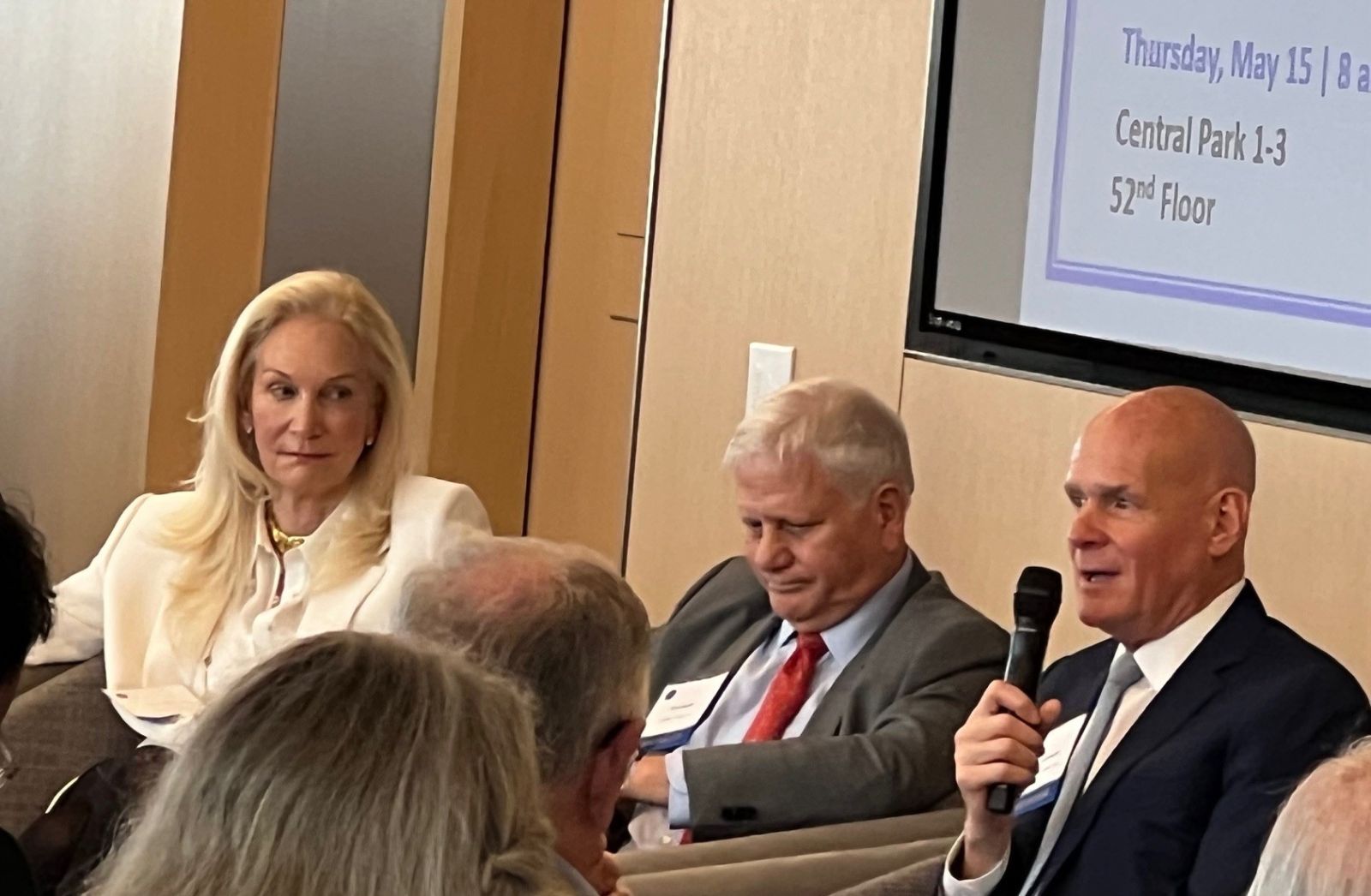Deep concerns about US trade and economic policies mixed with shards of optimism and keen investment advice at the Circulus Family Office Summit in New York.
The impact of the Trump administration’s erratic tariff mandates on the economy has been like “rushing a perfectly healthy patient to the hospital for open heart surgery,” said Randy Schwimmer, vice chair of Churchill Asset Management, speaking at the conference hosted by Circulus Group, a family office and private investor networking group.
Starting a trade war with China has been “absolutely absurd,” while the new tariffs are “a negative for the economy,” said Nancy Curtin, of AlTi Tiedemann Global. “There’s no question growth will slow down.”

Left to right: Nancy Curtin, Peter Borish, Randy Schwimmer
Analysts and corporate executives can’t rely on forecasting models because “you can’t model stupidity,” said Peter Borish, CEO of Computer Trading Corporation. The Trump administration’s economic policies are “not rational,” Borish maintained.
“There are going to be real problems with growth and revenue, interest rates are going to be significantly higher and the likelihood of a recession is now far higher.”
The highly respected academic and investment veteran André Perold had a somewhat more hopeful take, albeit with a dark twist.
While Perold, the CIO of HighVista Strategies, said he was “very concerned” about US tariffs, he pointed to what he characterized as the one skill Donald Trump has that everyone could agree on - the ability to win elections.
If Trump wants to win the midterm elections in November 2026, “he will back down” on his current policies and “try to sprinkle pixie dust on the US economy,” Perold speculated. If he doesn’t, the Republican party may force him to, but if they don’t, and Trump keeps his policies in place, which Perold thought was unlikely, he may try to prevent the elections from taking place or invalidate them, Perold said.
On the bright side…
Despite what James Li, president of Davidson Kempner Capital Management, described as a “massive amount of uncertainty” surrounding the US economy going forward, speakers agreed with former Federal Reserve Board vice chair Roger Ferguson, that, in fact, the economy is “in pretty good shape” right now.
While there was a “general sense of unease,” Ferguson praised the Federal Reserve for doing “exactly the right thing” when it came to interest rates, noting that inflation appeared to be “under control” and that the economy is “roughly at full employment.”
“The US is still by far the most developed country, and the general health of businesses is pretty good,” Schwimmer agreed. Private markets, particularly private credit, offered excellent opportunities for investors, he added.
Investment opportunities
Curtin also extolled the private credit market, adding that infrastructure and real assets in the form of residential housing and senior living facilities also offered “exciting” investment prospects.
Similarly, Curtin called artificial intelligence a “transformative technology that will impact “every sector” of the economy, particularly the pharmaceutical industry, which stands to benefit from AI-driven drug discoveries. She also predicted bond yields would rise and said gold prices still reflected a “bull market.”
The lack of liquidity in private equity also represented a potential investment opportunity, speakers said. There are “a ton of unsold companies” owned by private equity firms that will likely sell at around 20 per cent discounts, according to Curtin.
Liquidity and labor concerns
While Li called concern over capital reinvestment somewhat overstated, “the value of liquidity today is significantly higher than five years ago,” according to Li. The big question hanging over the economy, he said, is whether the US consumer is slowing down.
Ferguson also sounded a concern about the US labor market. While US companies that rely on immigrant labor support the need for border controls and legal immigration, they “are all saying the same thing,” according to Ferguson: the supply of labor they need is shrinking.
Alpha needs an edge
Perold, a professor emeritus at Harvard Business School, was interviewed by Circulus CEO and founder Joe Reilly, and spent much of his time discussing finance theory and investing strategies. He noted how difficult it is for active investors to beat passive indexing and said active investors “needed an edge to get alpha.” Companies his own fund invests in, Perold said, must have a big upside, limited capacity and a deep specialization.
In the private equity market, “exits are maxed out” and PE firms can only sell to each other, according to Perold. “Everybody’s praying for retail to go into privates” he said.
Curtin also offered some sage advice for bargain hunters in the private market: “look for stressed sellers, not stressed assets.”
